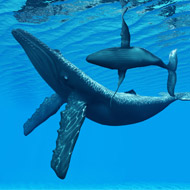Baby humpbacks ‘whisper’ to avoid danger

The tags revealed that he quiet calls usually took place while the whales were swimming.
Baby humpback whales communicate with their mothers using ‘whispers’ to avoid being overheard by killer whales, new research has found.
Writing in the journal Functional Ecology, ecologists describe how they used temporary tags on humpback mothers and their calves to learn more about the humpback’s life.
The study, which took place in Exmouth Gulf off western Australia, found that newborns communicate using ‘intimate grunts and squeaks’ - poles apart from the booming cry of the male humpback whale.
The tags revealed these quiet calls usually took place while the whales were swimming, suggesting that they help mother and calf keep together.
The researchers believe that such quiet communication helps reduce the risk of being overheard by killer whales. Lead author Simone Videson of Aarhus University, Denmark, explains:
“Killer whales hunt young humpback calves outside Exmouth Gulf, so by calling softly to its mother the calf is less likely to be heard by killer whales and avoid attracting male humpbacks who want to mate with the nursing females.”
He adds that the findings will help ecologists to conserve the Exmouth Gulf, to ensure taht the nursery waters are kept quiet as possible.
"From our research, we have learned that mother-calf pairs are likely to be sensitive to increases in ship noise. Because mother and calf communicate in whispers, shipping noise could easily mask these quiet calls,” he said.
There are two major humpback whale populations, one in the southern hemisphere and one in the north. During the winter, both populations breed in the tropics and then migrate to the Arctic or Antarctic during summer to feed.
A humpback whale’s pregnancy lasts from around one year and the calves stay with their mother until they are one year old.



 The veterinary mental health charity Vetlife is inviting the veterinary community to join it for a sponsored cold-water dip.
The veterinary mental health charity Vetlife is inviting the veterinary community to join it for a sponsored cold-water dip.